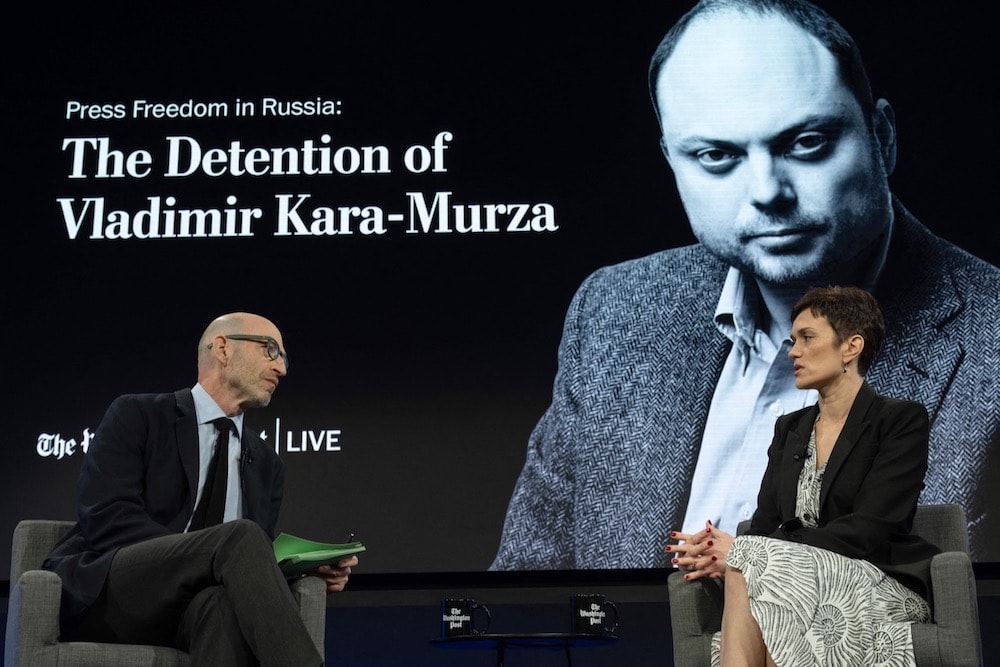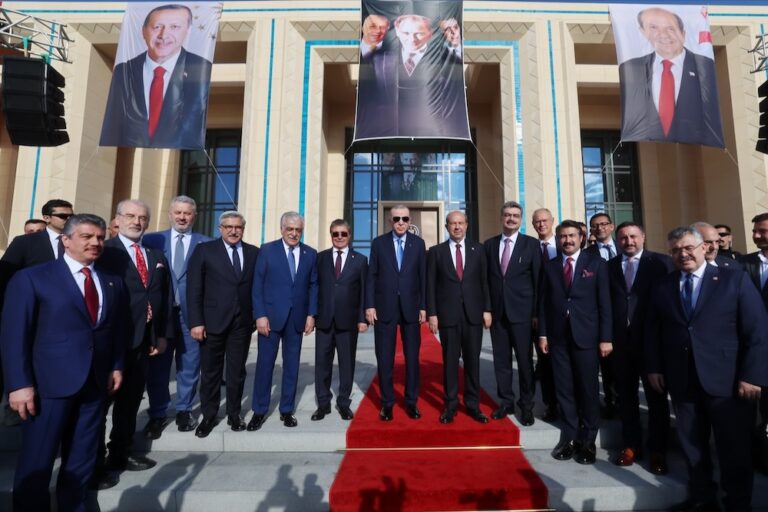Europe and Central Asia: A free expression round up produced by IFEX's Regional Editor Cathal Sheerin, based on IFEX member reports and news from the region.
Free expression crackdown ahead of general election in Turkey; a welcome win for journalism in Belarus; high-profile figures persecuted in Russia for criticising the war; IFEX members in Europe and Central Asia mark World Press Freedom Day.
“Dismantling pro-Kurdish media”
Turkey’s crackdown on media and critical voices is intensifying as the country heads towards a general election on 14 May.
On 29 April, 49 arrest warrants were issued for individuals – including journalists – across 15 provinces, with Kurdish voices continuing to bear the brunt of the persecution.
Days earlier, on 25 April, 128 individuals with Kurdish links – journalists, politicians, artists and activists – were detained in raids across 21 cities, resulting in 28 arrests. Reporters Without Borders (RSF) described the detentions as “a political manoeuvre designed to dismantle pro-Kurdish media and destabilise opposition parties before the elections”. Rights groups called for the immediate release of all the detainees. A group of women journalists who protested the arrests were beaten and detained in Diyarbakir, Turkey’s largest majority-Kurdish city.
Earlier in the month, a court accepted the indictment of 18 Kurdish media workers – arrested in a separate wave of detentions and held behind bars since June 2022 – whose trial on charges of “membership of an illegal organisation” will begin on 11 July.
For years, IFEX members have been raising their concerns about the threat posed by President Erdoğan’s government to freedom of expression and the democratic process.
In April, IFEX members issued a statement calling on Turkey’s broadcast media regulator (RTÜK) to stop fining broadcasters for their critical reporting about the government. RSF also made 15 recommendations to election candidates, inviting them to “defend press freedom” by restoring the independence of the judiciary and reforming the law to protect journalists.
Turkey’s LGBTQI+ community continues to be a target of Erdoğan’s culture-war rhetoric. Anti-LGBTQI+ sentiment has been on the rise for several months in Turkey, encouraged by the ruling party. This month, Erdoğan accused the political opposition of being “pro-LGBT” and told voters that “14 May will be the day to teach a lesson to those who support LGBT and violence against women”.
It should be emphasised that Erdoğan’s apparent concern for the victims of gender-based violence is not matched by his actions: in 2021, he withdrew Turkey from the Istanbul Convention on preventing violence against women.
Draconian sentence for Raman Pratasevich
On 3 May – World Press Freedom Day – a court in Belarus sentenced editor Raman Pratasevich to eight years in prison in connection to his work for the Telegram channel NEXTA. His NEXTA colleagues, Yan Rudzik and Stsypan Putsila, were sentenced in absentia to 19 years and 20 years in prison respectively. They were convicted on a range of charges, including “organising mass protests” and publicly calling for “the seizure of state power and acts of terrorism”. The authorities labelled NEXTA a “terrorist organisation” in April 2022.
The persecution of Belarusian journalists continued unabated throughout April: Kanstantsin Zalatykh, director of newspaper Belorusy i Rynok, was sentenced to four years in prison on various defamation-related charges; Aliaksandr Mantsevich, editor-in-chief of Rehijanalnaja Hazeta, was charged with “spreading false information” and faces four years in prison if found guilty; and newspaper Infa-Kurier ceased publication after the authorities labelled it “extremist”.
However, April also saw a win for Belarusian journalism when the UN Human Rights Committee decided that the Lukashenka regime violated the right to freedom of expression of four journalists, each of whom had been given administrative fines for “distributing media products without accreditation”.
The journalists – Tatsiana Smotkina, Dzmitry Lupach, Tamara Schapetkina and Larysa Schyrakova – had been charged and fined under Belarus’s draconian Law on Mass Media, which bans journalists from working with foreign media on Belarusian territory if they don’t have press credentials identifying them as foreign media representatives.
Belarus is now obliged to compensate the journalists for their fines and pay their court expenses; it will also have to revise the Law on Mass Media.
PEN America published its 2022 Freedom to Write Index in April. It reports that 16 writers and public intellectuals were held in custody in Belarus in 2022, many for exercising their right to freedom of expression.
“An attempt to demoralise and quash civic activism”
Russia’s invasion of Ukraine resulted in the death of another journalist in April, when Russian snipers in Kherson shot dead La Repubblica producer Bohdan Bitik and wounded the newspaper’s correspondent Corrado Zunino. Both journalists were wearing press identification at the time of the attack.
In Russia, opposition politician and prominent war-critic Vladimir Kara-Murza was convicted of spreading “false information” about the Russian army, and of involvement with an “undesirable organisation”. Kara-Murza, who was arrested in April 2022, was sentenced to 25 years in prison. Human Rights Watch described the Kremlin’s persecution of Kara-Murza as a “travesty” and “part of its efforts to demoralise and quash civic activism”.
Less than two weeks after the sentencing of Kara-Murza, President Putin signed into law amendments that allow the removal of Russian citizenship from naturalised citizens convicted of treason or of spreading “false information” about the Russian army. The potential sentence for treason was also increased to life imprisonment.
At the end of the month, Oleg Orlov – co-chair of human rights group Memorial and one of Russia’s most prominent rights defenders – was indicted on charges of repeatedly “discrediting” the military since Russia began its war against Ukraine. He faces up to three years in prison if convicted. The charges are based on Orlov’s one-man anti-war demonstrations and his criticism of the war on social media.
Since February 2022, at least 66 people have been criminally prosecuted for repeatedly “discrediting” the army.
Raising voices for free expression: IFEX Members mark World Press Freedom Day
Many organisations in the IFEX network advocate for press freedom in both online and offline spaces year-round. In honour of World Press Freedom Day, members in Europe and Central Asia took part in various initiatives and activities to defend the rights of journalists, which are inextricably connected to people’s right to freedom of expression and information. Here are some of the highlights showcasing how members marked the day:
- The Belarusian Association of Journalists (BAJ) organised a Solidarity Marathon to show support for Belarus’s journalists. BAJ kicked off the action in Vilnius, Lithuania, and called on journalists and organisations around the world to pressure President Lukashenka to release the 33 journalists currently imprisoned in Belarus.
- In Turkey, Bianet published its BIA Media Monitoring Report, which provides a snapshot of the deteriorating environment for free expression ahead of May’s general election.
- The European Federation of Journalists (EFJ) held a two-day conference in Brussels focused on how to create a safer and healthier working environment for journalists.
- The Independent Journalism Centre of Moldova organised a flash mob demonstration in front of the Russian embassy to protest Russia’s invasion of Ukraine and to highlight the war’s toll on the media.
- The International Press Institute issued a statement calling on the Czech Republic to prioritise safeguarding media freedom, and on the government to kick-start media reform plans that ground to a halt last year.
- Mediacentar Sarajevo published an overview of the major threats faced by journalists in Bosnia and Herzegovina in the year since 3 May 2022, highlighting moves to recriminalise defamation in Republic Srpska.
In brief
In April, RSF was barred from visiting Wikileaks founder Julian Assange in Belmarsh Prison, UK, despite receiving official confirmation that the visit would be permitted. Later in the month, in an act of solidarity with the jailed publisher, member unions of EFJ made Assange a member of their organisations.
In late April, a court in Kyrgyzstan ordered the closure of Radio Free Europe Radio Liberty (RFE/RL)’s Kyrgyz language service, Radio Azattyk, over the broadcaster’s refusal to remove a September 2022 video about clashes on a disputed section of the Kyrgyz-Tajik border. The authorities claimed that the video had been pro-Tajik, and blocked Radio Azattyk’s website in October 2022. The following month, the outlet’s bank accounts were frozen under money laundering legislation.
IFEX joined rights groups in calling on the authorities in Malta to give full protection to writer, activist and president of the NGO Repubblika, Robert Aquilina. Aquilina has been the target of several threats in recent years, and was given police protection in 2021 (though this was reduced in July 2022). Repubblika is a human rights and rule of law NGO; it frequently criticises the failings of the Maltese authorities.



